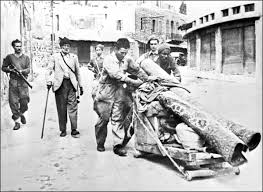Jews Envision Arms Imports, Associated Press, NY Times, Apr. 25, 1948.
 JERUSALEM, April 24 (AP)-A Jewish spokesman said today that the Haifa victory would have widespread repercussions on the gasoline supply to neighboring Arab countries, and give the Jews first claim to the port when the British leave in August for the import of arms and the entry of Jewish immigrants.
JERUSALEM, April 24 (AP)-A Jewish spokesman said today that the Haifa victory would have widespread repercussions on the gasoline supply to neighboring Arab countries, and give the Jews first claim to the port when the British leave in August for the import of arms and the entry of Jewish immigrants.
Arabs in the city were under a Jewish curfew, virtual house arrest. The Haganah said that five field guns, mortars and other arms had been found in an inch-by-inch search of Arab quarters.
The Arab population was being moved across the bay to Acre by British Army landing craft and small boats, and plans were being made to move other thousands by British Army truck overland to Nazareth, neighboring Lebanon and Nablus in the Arab’s so-called “triangle of strength” in central Palestine.
Thousands still huddled in refuges without food.
After heavy firing in the border land of Arab Jaffa and Jewish Tel Aviv on the coast last night, the Haganah reported that it had moved some of its strongholds into Arab territory.
Jerusalem’s Services Crumble
Jerusalem is now girding for war like a southern United States city preparing for a hurricane.
The 150,000 Jews and Arabs here believe the chances for a truce are dim. Both claim the city for their capital, and both are buckling on the sword to fight for it.
Public services are crumbling, as the British pull out faster than anticipated. British Army headquarters began moving out today in a long convoy bound for Haifa.
In Jerusalem, as elsewhere in Palestine at the moment, the military advantage is with the Jews.
Every street of the city is blocked by road barriers, some twenty feet high. Jewish and Arab Tommy-gunners peer over them at every approaching car or person. Motorists able to get enough gasoline to drive have their cars searched as many as half a dozen times in a ten-minute trip.
Many markets in the mixed areas are cementing shut their doors and windows. Business has all but collapsed. Mail still comes through Weeks late. Telegrams to Tel Aviv and Haifa take as much as five days. By next week there may be only a couple dozen British officials here. Three dozen foreign correspondents face loss of their cable link with the outside world soon.
The consular corps of a dozen nations are evacuating women staff members.
The main attention of political observers was directed to Amman, Trans-Jordan capital, where the Arab League’s military council was meeting with King Abdullah to decide when and whether to send Arab national armies into Palestine.



